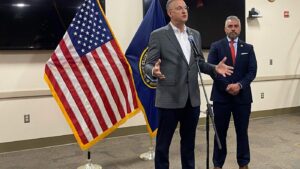Date Posted: 2025-05-10 00:08:29 | Video Duration: 00:26:58
At Preston Hollow Presbyterian Church, sermons are more than just religious discourses; they’re opportunities for transformation and renewal. This week, the sermon delved into the complex tapestry of family relationships, exploring how resurrection, as promised by Christ, isn’t confined to biblical times but is a present and ongoing reality in our lives.
The sermon is part of a series titled “Resurrection in Real Life,” which seeks to uncover how the resurrection’s promise can be realized in our everyday struggles, especially where hope seems lost and life feels stagnant. This week’s focus was on parent-child relationships, a topic acknowledged as both beautiful and complicated. As the speaker pointed out, families are “beautiful and yet complicated,” serving as both our greatest teachers and the sources of our deepest challenges.
One of the key scriptural references was Matthew 10:34-36, where Jesus states, “Do not think that I have come to bring peace to the earth; I have not come to bring peace, but a sword.” At first glance, these words might seem jarring and contradictory to the image of Jesus as a bringer of peace. However, the sermon offered a fresh interpretation, suggesting that the ‘sword’ Jesus brings is not one of destruction but of transformation. It’s akin to a scalpel, precise and purposeful, cutting away that which is dead and toxic in our lives to pave the way for new life.
The sermon illustrated these themes through a poignant story about Andrew Young, a former ambassador to the United Nations, and his daughter. During a church service, Young’s daughter felt called to serve in Uganda, inspired by a sermon from Millard Fuller, the founder of Habitat for Humanity. Despite her father’s initial resistance, she was determined to follow what she believed to be God’s calling. This narrative highlighted the tension between parental expectations and a child’s path, ultimately showing that true faith sometimes requires letting go and allowing loved ones to pursue their own spiritual journeys.
In addressing the complexities of family dynamics, the sermon encouraged listeners to reflect on their own familial relationships. It posed challenging questions about what might need to be ‘cut out’ to foster wholeness and healing. Whether it’s longstanding patterns of conditional love, cycles of shame, or unspoken tensions, the sermon invited individuals to face these issues courageously.
Ultimately, the message was one of hope and possibility. By daring to let go of what we fear and surrendering to what Christ seeks to remove, we open ourselves to the promise of resurrection and new life. The ‘sword’ is not meant to harm but to heal, to transform rather than destroy.
As the sermon concluded, the congregation was invited to pray, seeking God’s help in overcoming disbelief and embracing the transformative power of resurrection in their lives. The call to action was clear: to have the courage to follow where Jesus is leading, trusting that the path, though challenging, leads to wholeness and renewal.




